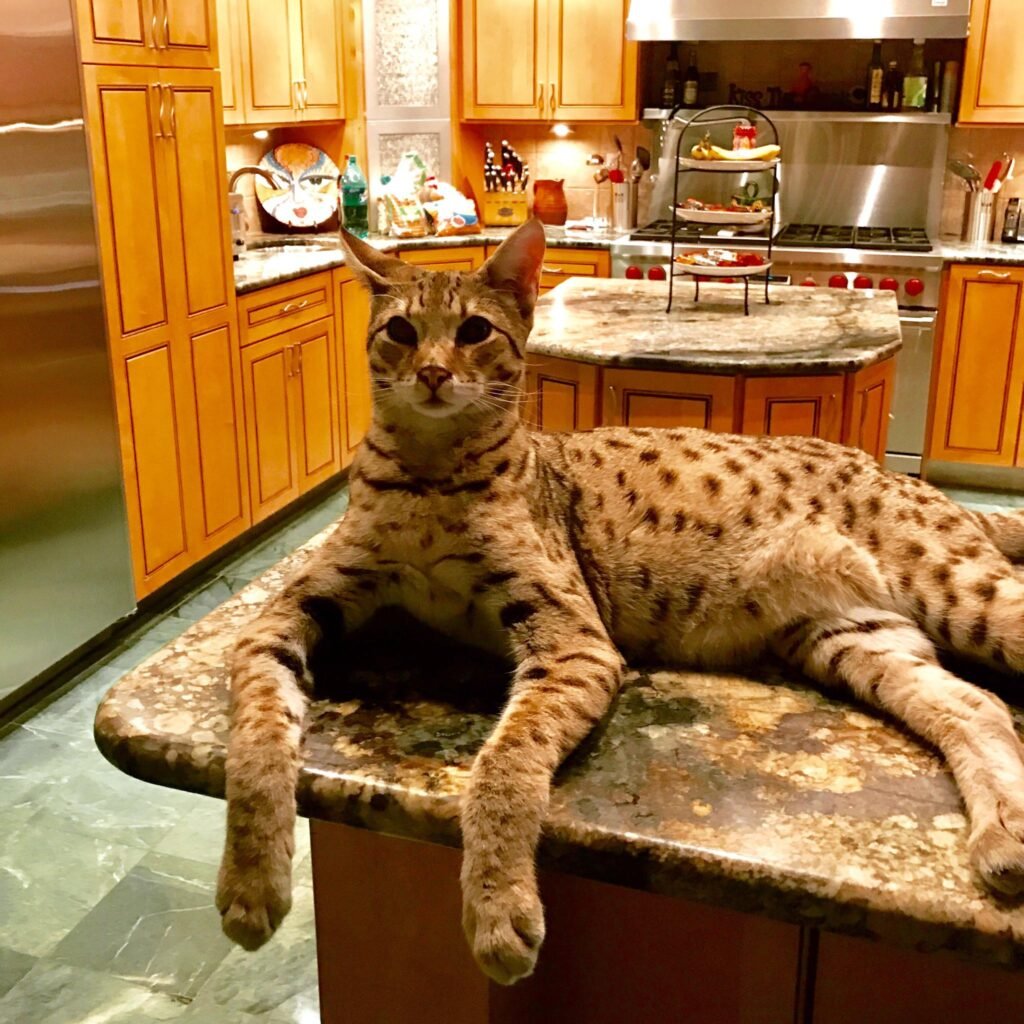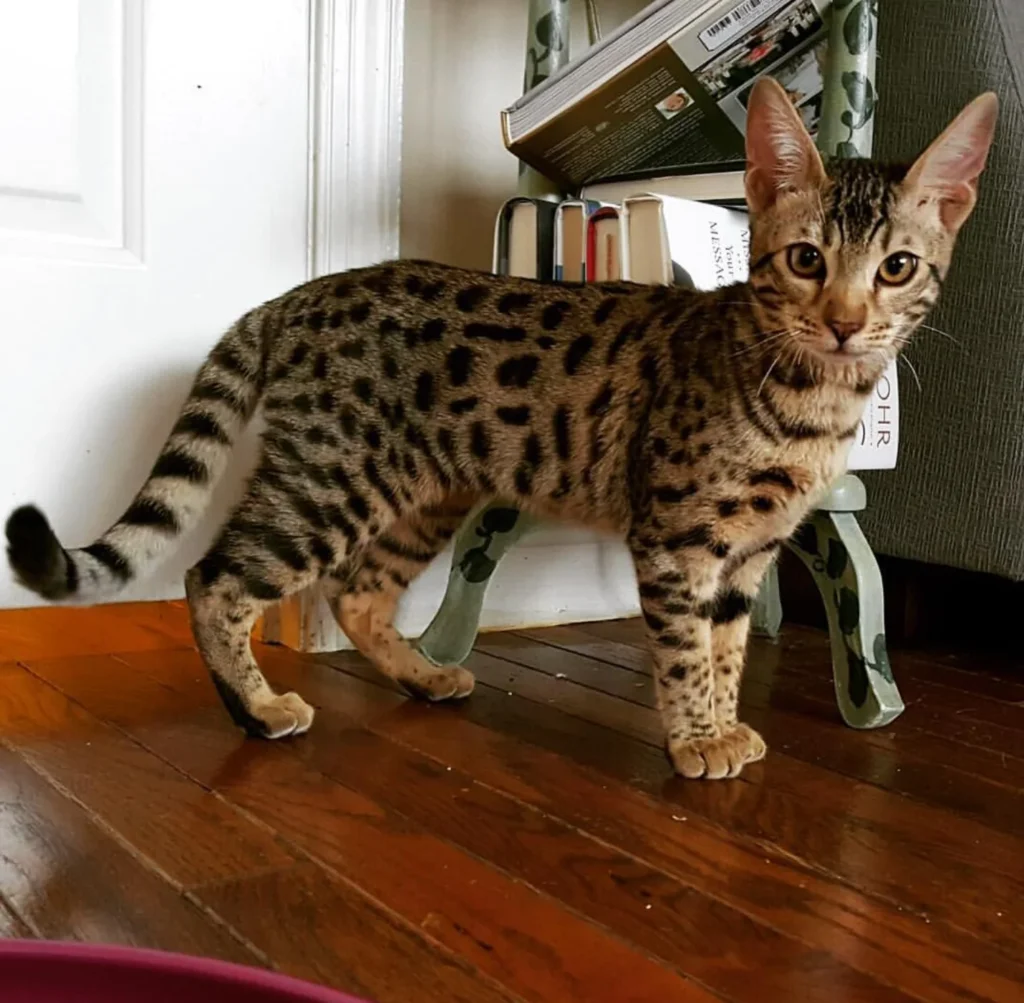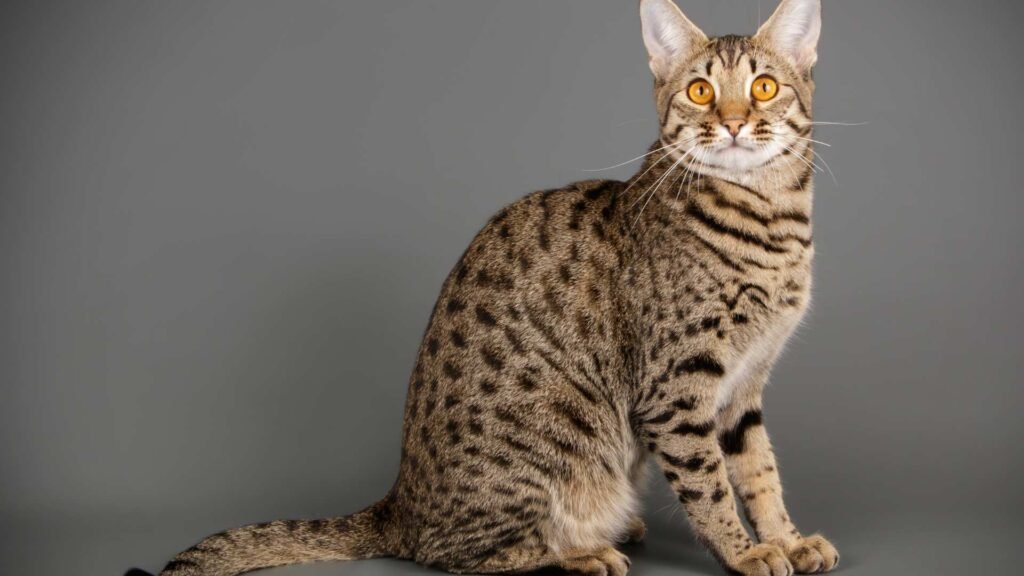Savannah
The Savannah cat is a distinctive breed, renowned for its striking physical traits that reflect its exotic ancestry. This breed is characterized by its tall stature, which can reach up to 17 inches at the shoulder, creating an elegant and imposing presence. Complementing their height, Savannah cats possess long legs that provide them with an agile and athletic build, enabling them to jump and climb with remarkable proficiency.

One of the most eye-catching features of Savannah cats is their large, upright ears. These ears not only enhance their feline appeal but also serve a crucial function, allowing for exceptional hearing. In addition, their eyes are often almond-shaped and can vary in color, with hues ranging from gold to green, further adding to their allure. The coat of a Savannah cat is typically characterized by a medium-length, soft texture, adorned with leopard-like markings that exhibit a beautiful contrast on their background fur. The spots and rosettes of these cats fall in line with the breed’s serval lineage, giving them a wild, captivating appearance.
An important aspect of the Savannah cat’s classification is its generational categorization, which spans from F1 to F5. The “F” denotes “filial” and indicates the number of generations removed from the serval, a wild ancestor. For instance, an F1 Savannah cat is directly descended from a serval, while an F5 is further back in lineage. Understanding these classifications is essential for potential owners, as it may influence the cat’s size, temperament, and care requirements.
Moreover, prospective Savannah cat owners should be aware of various health considerations related to their physical attributes. These may include potential hereditary conditions and routine care regimes that cater to their unique needs, ensuring the longevity and well-being of these majestic felines.

Personality
Savannah cats are renowned for their unique personality traits, which contribute to their appeal as pets. One of the most striking characteristics of Savannah cats is their playful nature. These felines possess an inherent curiosity and energy that drives them to explore their surroundings vigorously. Whether they are pouncing on toys, climbing to high places, or engaging in interactive play, Savannah cats thrive on activity and stimulation.
Social interaction is another defining trait of Savannah cats. These animals are known for forming strong bonds with their families. Their loyalty often manifests as affectionate behavior; they are likely to follow their owners around the house, seeking companionship and attention. When socialized from a young age, Savannah cats typically get along well with other pets, making them suitable additions to multi-pet households.
Moreover, these cats are highly intelligent, displaying an ability to learn commands and tricks quickly. It is not uncommon for Savannah cats to engage in problem-solving activities, demonstrating their mental agility. To keep their sharp minds occupied, it is essential for owners to provide various forms of enrichment, such as puzzles, interactive toys, and opportunities for exploration. Regular social interaction with their human companions is equally important to maintain their emotional well-being.
In addition to their playful and affectionate demeanor, Savannah cats possess a need for stimulation that requires careful consideration from potential owners. Without adequate mental and physical engagement, these cats may exhibit destructive behaviors stemming from boredom. Therefore, creating a stimulating environment with ample opportunities for play and interaction is crucial for their overall happiness. Understanding these personality traits will empower potential owners to provide a loving and suitable home for these remarkable pets, ensuring that Savannah cats flourish in a nurturing environment.
Origins
The Savannah cat breed is widely recognized for its striking appearance and dynamic personality. This unique breed originated from the hybridization of a domesticated cat and a serval, a wild cat native to Africa. The inception of the Savannah cat can be traced back to the late 1980s when Judy Sudgen, an American breeder, sought to create a domesticated companion that mirrored the serval’s exotic elegance. The first documented breeding occurred when a serval mated with a Siamese cat, leading to the birth of a hybrid kitten known as a F1 generation.

The F1 Savannah is distinguished by its distinctive coat pattern and long legs, resembling its wild ancestor, the serval. Subsequent generations, including F2 and F3, displayed increasing traits typical of domestic cats, yet retained various characteristics of their wild origins, such as loyalty and intelligence. Over the years, this breed garnered attention from feline enthusiasts and breeders, prompting the establishment of specific breeding standards that emphasize the cat’s unique genetic attributes.
As the breed’s popularity grew, it attracted the interest of several cat associations. The International Cat Association (TICA) officially recognized the Savannah cat in 2001, following a comprehensive evaluation of its attributes and breeding practices. Since then, various associations have accepted the breed, furthering its reputation as a domesticated pet. However, owning a Savannah cat does require careful consideration due to its hybrid nature. Potential owners should familiarize themselves with the breed’s behavioral traits, which may include the need for stimulation and adequate space. Responsible breeding and thorough understanding of the Savannah cat’s needs are essential for successful integration into homes, ensuring that both cat and owner enjoy a harmonious relationship
Care of the Savannah cat breed
Caring for a Savannah cat requires a commitment to fulfilling their unique needs, given their energetic and intelligent nature. Regular exercise is crucial for these active felines. Providing a spacious environment with areas to run, jump, and explore will help satisfy their instinctual behaviors. Interactive playtime is vital, and cat trees, tunnels, and feather toys can stimulate their playful spirit while encouraging physical activity. Aim for at least 30 to 60 minutes of interactive play each day to keep them mentally and physically stimulated.
Socialization from an early age is paramount in ensuring that your Savannah cat grows up to be well-adjusted and friendly. Expose them to various people, pets, and environments to help them develop confidence and adaptability. Group playdates, when introduced appropriately, can also foster healthy interactions with other animals. As they are known to be quite affectionate, allowing them positive experiences with human companionship will aid in their overall social development.
When it comes to training, utilize positive reinforcement techniques, rewarding desirable behaviors with treats or praise. Savannah cats are known for their intelligence, which means they can learn commands and tricks faster than many other breeds. Incorporate training sessions into your daily routine, keeping them short and engaging to maintain their interest. Activities such as clicker training can be particularly effective, as they facilitate communication and understanding between you and your pet.
Grooming is another essential aspect of their care regimen. Regular brushing helps to reduce shedding and matting, and it fosters a bond between owner and cat. In terms of diet, provide high-quality cat food that is rich in protein to support their active lifestyle. Ensure that fresh water is always accessible, and monitor their food intake to prevent obesity.
Finally, create a safe living environment for your Savannah cat by securing windows and balconies and providing opportunities to climb and explore safely. By adhering to these guidelines, you will ensure a happy, healthy, and well-adjusted Savannah cat.
Health
Savannah cats are generally healthy, with a strong genetic background from their wild ancestor, the African serval. They have a low risk of hereditary diseases but may be prone to hypertrophic cardiomyopathy (HCM). A balanced diet, regular vet check-ups, and plenty of exercise help maintain their health. Proper care ensures a long lifespan of 12-20 years.
Nutrition
The Savannah cat, a hybrid breed known for its energy and wild ancestry, requires a high-protein, balanced diet to thrive. A mix of premium raw meat, high-quality wet food, and grain-free kibble helps maintain their lean muscle and overall health. Proper hydration and essential nutrients like taurine are crucial. Learn more about the best nutrition plan for your Savannah cat!
Cleanliness
The Savannah cat is a naturally clean breed with minimal grooming needs. Their short, sleek coat sheds little and requires only occasional brushing to remove loose hair. They groom themselves frequently, much like domestic cats, and rarely develop strong odors. Regular litter box maintenance and occasional nail trimming keep them in top hygiene. With their love for water, some Savannah cats even enjoy occasional baths. This breed’s cleanliness makes them an excellent choice for owners seeking a low-maintenance yet exotic feline companion.
Best cat breeds for kids
The Savannah cat is an energetic, intelligent, and affectionate breed, making it a great choice for families with kids. Known for its exotic appearance and playful nature, this hybrid cat loves interactive play and bonding with children. With proper socialization, Savannah cats are loyal, friendly, and enjoy being part of family activities. Their high energy levels make them ideal for active households looking for a fun-loving feline companion.
People who have seen this breed have also visited…
In this section you can find completely detailed information about the breed of your cat.
